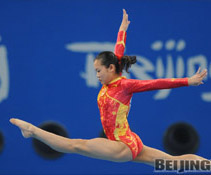|
Although this Olympics might be the last time for triple Olympians Yang Wei, Li Xiaopeng and Huang Xu, it is a comfort for all Chinese to see upstarts Chen Yibing, Xiao Qin, Zou Kai, and other young athletes in China's gymnastics team showing world-class skills. Five days after his team's success at the National Indoor Stadium, 20-year-old Zou Kai won the men's floor exercises gold medal with 16.050 points.
Women: more balanced skills
|

|
|
HIGH FLYER:Women's team captain Cheng Fei competes on the balance beam during the Olympic finals of the women's gymnastics team event |
Before 2008, the Chinese women's gymnastics team claimed two bronze medals in the Los Angeles Olympics in 1984 and the Sydney Olympics in 2000. In 2004, it finished seventh in Athens. For a long time the team could only rely on individual performances on the uneven bars and balance beam, for gold. Just before the Athens Games the team adjusted its strategy, understanding it would never reach the dream of team gold if it was only strong in certain disciplines.
Cheng Fei joined the national team in 2003, leading the way in overcoming the traditional weakness in vaulting and floor exercises, in which only gymnasts with great power and strength in their legs can succeed.
Ma Yanhong, winner of the uneven bars at the Los Angeles Olympics, said, "Cheng Fei has the greatest lower body strength in successive Chinese women's gymnastics team." This may explain why Lu Shanzhen, the head coach, placed high expectations on Cheng and made her team captain. Meanwhile, a group of younger athletes with the same traits as Cheng, such as Jiang Yuyuan and Li Shanshan, were recruited as backups for the Chinese gymnastics team. In the Beijing Olympics, from the qualifiers to the finals, China almost evened the scores in vaulting with the United States and caused a major upset by 1 point in the floor exercises.
Bright future
Russia and Romania, two traditional superpowers in gymnastics, were less impressive in the team finals of the Beijing Olympic Games. The Russian and Romanian men's teams finished sixth and seventh, respectively; while Russia's girls lost bronze to the 2004 champions Romania.
The new scoring system effective after the Athens Olympics has also imposed negative impacts on Russian and Romanian gymnasts.
By adopting an A+B scoring system, the International Gymnastics Federation dropped the "Perfect 10" in 2006, which works against Russians and Romanians, who previously excelled in error-free performances, but favors the Chinese gymnasts who are more proficient in difficulty of movement. The A score measures the difficulty and represents an athlete's capacity, while the B measures the quality of performance. In the team finals of these Olympics, the Chinese men's team beat Japan by 7.25 points and the women's team led the United States by 2.375 points. Both the men's and women's teams took advantages of the A score.
Besides, success rate matters a lot to the gymnasts, especially the female gymnasts, who competed in only four events (men in six). Any tiny error may fail the whole team. In the finals of the Beijing Games, the United States made two errors while China made only one. | 